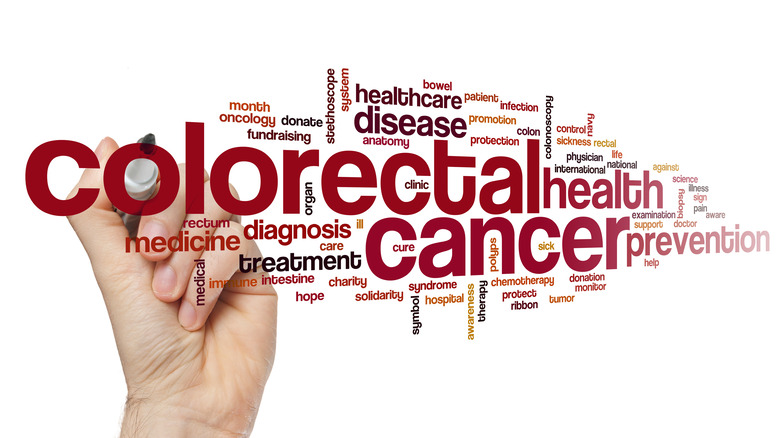Kirstie Alley's Death Has Doctors Issuing An Important Warning
Actress Kirstie Alley passed away at the age of 71 on December 5, 2022, as reported by AP News. Her death is attributed to colon cancer which was only recently discovered prior to her passing (via AOL). Colon cancer, according to the National Cancer Institute, is currently the fourth most common cancer diagnosis in the United States. Since the death of the renowned actress, many physicians, specialists, and healthcare advocates have spoken out about the warning signs of colon cancer and the need to take potential symptoms seriously, per AOL.
Often referred to as colorectal cancer or colon cancer, the disease affects the colon, rectal area, and anal region of the body (via the Mayo Clinic). This type of cancer often occurs when cells in the colon of the body mutate from healthy, normal cells to cancerous cells that erratically multiply, thus forming tumors. If left unaddressed, cancer cells and tumors can continue to grow and destroy tissue that the colon requires to function properly. Metastasis can also occur, which causes cancerous cells to grow in other parts of the body.
Being aware of the early signs of colorectal cancer can help keep you informed of any potential changes in your body that may need to be assessed by a qualified healthcare provider. Here's what doctors want you to know about colon cancer symptoms.
Screening is essential
Proper screening is important for identifying colorectal cancer since many signs often mimic the symptoms of similar gastrointestinal and digestive tract conditions like irritable bowel syndrome and colorectal hemorrhoids (per AOL). Screening is the best way to diagnose and catch colon cancer early on, but many people are either unaware of the need for screening or haven't had access to diagnostic methods, like colonoscopies.
Doctors want to spread the word that colonoscopies are highly recommended every 10 years beginning at age 45. The reason for this is because nine out of 10 colorectal cancer cases are diagnosed in patients over the age of 50. However, medical professionals are beginning to see a rise in colon cancer in patients under the age of 50 and anticipate that approximately 15% of future cases will be diagnosed in younger patients.
In addition to also urging people to seek screenings, the Centers for Disease Control and Prevention (CDC) report that symptoms of colon cancer frequently include changes in bowel movements that can present as bloody or loose stool, diarrhea, constipation, or a sensation of not being able to completely empty the bowel. Intense abdominal pain or cramping that becomes continuous is another common sign of possible colorectal cancer. Polyps in the colon can become cancerous, but many times a person may be completely unaware that a polyp is present, which is another reason why seeking screening is essential to finding and treating colon cancer early on.
What causes colon cancer?
According to the American Cancer Society (ACS), there are several risk factors that may increase the odds of developing colon cancer. These include lifestyle factors such as being overweight or obese, a lack of physical activity, a diet high in red and/or processed meat, smoking, and moderate to heavy alcohol drinking. The presence of polyps in your colon also raises the risks.
The odds of developing colon cancer also increase if you have other bowel diseases such as ulcerative colitis or Crohn's Disease. A family history of cancer and being diagnosed with familial adenomatous polyposis (FAP) or Lynch syndrome also raises risks. Being older also increases the odds, per the Centers for Disease Control and Prevention (CDC). Additionally, chances of developing colorectal cancer double if a parent or sibling is diagnosed with it, and your chances are also higher if more than one family member has it, per eMedicineHealth.
Can you prevent colon cancer?
Other than getting screened, some lifestyle changes might decrease your odds of developing colon cancer. The ACS states that maintaining a healthy weight and being physically active is a good place to start. According to Harvard Health Publishing, regular exercise (at least 30 minutes per day) may decrease risks by 30% to 40%. Increasing the number of vegetables, fruits, and whole grains you eat while reducing the amount of red meat could also help your odds. Adding more fiber to your diet might also lower the odds.
Other proactive measures include getting enough vitamin D and calcium in your diet, per Harvard Health Publishing. Food rich in these nutrients includes low-fat dairy products, spinach, kale, salmon, white beans, and soybeans (via WebMD). You should also stop smoking. Harvard Health Publishing reports that some studies show that women who smoke increase their odds of developing cancer by 19%. Taking a low dose of aspirin could also be beneficial for women who are at risk for the disease but it's always a good idea to talk with your doctor before starting any new medication regimen.




